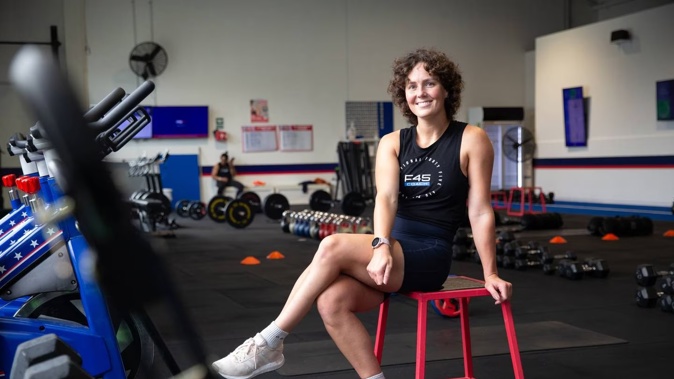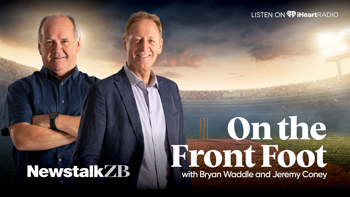
A woman diagnosed with breast cancer at 26 after it took four visits to three different GPs before she was referred to a specialist has a message for others facing barriers in accessing healthcare.
If you don’t feel listened to, as Ash Williams didn’t after discovering a lump in her breast, keep pushing for what you need. The Auckland gym owner is among Breast Cancer Foundation NZ supporters around the country hosting Pink Ribbon breakfasts this month to raise money for the charity.
“It was quite disappointing,” Williams said of her initial attempts to get a diagnosis two years ago.
“Because I went to my family doctor, who my family’s been going to for years, and they knew we had the BRCA gene [mutation] in our family. And still there was no urgency to it.
“And then I saw two more doctors after her and they were both exactly the same.”
It meant the Aucklander had to wait three months to be seen by a specialist, after which it was found in May 2021 that she had breast cancer.
“Originally, they just thought it was stage two breast cancer … because they did a biopsy of lymph nodes and they all came back clear. And then they did one more biopsy, they were just like ‘we just want to be sure’.
“And in that biopsy, they found one [lymph node] that had cancer.”
After gene testing confirmed she had the BRCA gene mutation, Williams decided to have a double mastectomy, followed by a breast reconstruction.
A mutation in one of the breast cancer genes, BRCA1 or BRCA2, means a much higher risk of developing breast or ovarian cancer compared to those without the mutation.
/cloudfront-ap-southeast-2.images.arcpublishing.com/nzme/FC2EBMZCYRFINT6P47KGQUCIRU.jpg)
You're more likely to carry an important mutation in the BRCA gene the more family members with breast or ovarian cancer you have, according to Health Navigator NZ. Photo / 123RF
Williams then faced an aggressive treatment plan, which included four-and-a-half months of chemotherapy, 15 rounds of radiation, and hormone treatment - all during the Covid-19 pandemic.
“I lost my hair and the side effects of chemo were horrible. But I’ve always been a very strong-minded person, I think from having a background in professional triathlon, so each day I kept reminding myself that I was one day closer to being in the clear.
“What doesn’t kill you makes you stronger … and you have a whole new outlook on life.”
As well as encouraging people to push back if they felt medical experts weren’t taking their symptoms seriously, she also wanted to remind people to get any health concerns checked promptly.
She’d initially had a “she’ll be right” attitude after discovering a lump in her breast.
“When I told my mum about [it] she was in my ear constantly about getting it checked, because her mum has survived breast and ovarian cancer … mum kept pushing me to follow up about getting the tests, and I’m so glad she did.”
Pink Ribbon breakfasts raise funds for research, education and awareness programmes, advocacy campaigns and patient support services - something Williams had personal experience of.
“I had loads of side effects during treatment and I could never get through to the oncology nurses, but the Breast Cancer Foundation nurses would always pick up the phone. It was such a relief to get their help.”
The foundation doesn’t receive Government funding for its efforts in relation to a disease one in 9 New Zealand women will be diagnosed with, its chief executive Ah-Leen Rayner said.
“Every donation helps us to achieve our ambitious goal of ensuring no more Kiwi women die from breast cancer.”
/cloudfront-ap-southeast-2.images.arcpublishing.com/nzme/OIW3WOXPZBSVG2XDYDRO7BXLXA.jpg)
Ah-Leen Rayner is chief executive of the Breast Cancer Foundation NZ. Photo / Supplied
Having breast cancer at 26 had forced her to “grow up and make some pretty tough decisions” about the future, Williams said.
Now 28, she has a partner, a dog and is the owner of the F45 studio in Silverdale.
“I know every person’s experience with breast cancer is different, and I feel lucky that I’m now in remission, running my own business, and living the absolute dream.
“I’m so proud of what I had to overcome to get here.”
How to help
You can support Williams’ Pink Ribbon Breakfast by donating here: pinkribbonbreakfast.co.nz/page/ashwilliams
For more information and to register to host a Pink Ribbon Breakfast go to: pinkribbonbreakfast.co.nz
Information on breast cancer can be found at: breastcancerfoundation.org.nz
Take your Radio, Podcasts and Music with you









